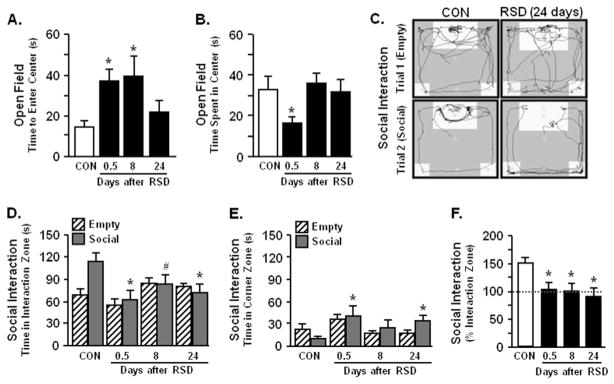Figure 1.

Repeated social defeat (RSD)-induced anxiety-like behavior was resolved by 24 days, but social avoidance was maintained. Male C57BL/6 mice were subjected to repeated social defeat or left undisturbed as control mice (CON). Anxiety-like behavior and social avoidance were determined 0.5, 8, or 24 days after the final cycle of RSD. Repeated social defeat significantly increased anxiety-like behavior with (A) increased time to enter the center of the open-field (F3,47 = 3.34, p < .03) and (B) decreased total time spent in the open-field (F3,47 = 2.20, p = .10). (C) Representative activity traces of CON or RSD (24 days) mice are shown for empty and social trials. Repeated social defeat caused social avoidance with (D) decreased time spent in the interaction zone (social: F3,33 = 3.92, p < .02) and (E) increased time spent in corner zones (empty: F3,34 = 2.87, p < .05, | social: F3,34 = 2.17, p = .10) (F) Repeated social defeat-induced social avoidance was maintained over time shown by decreased percent time spent in the interaction zone compared between trials [100 × (social/empty)] (F3,34 = 3.64, p < .02). Bars represent the mean ± SEM. Means with asterisk (*) are significantly different from CON (p < .05) and means with (#) tended to be different from CON (p < .06–.10).
